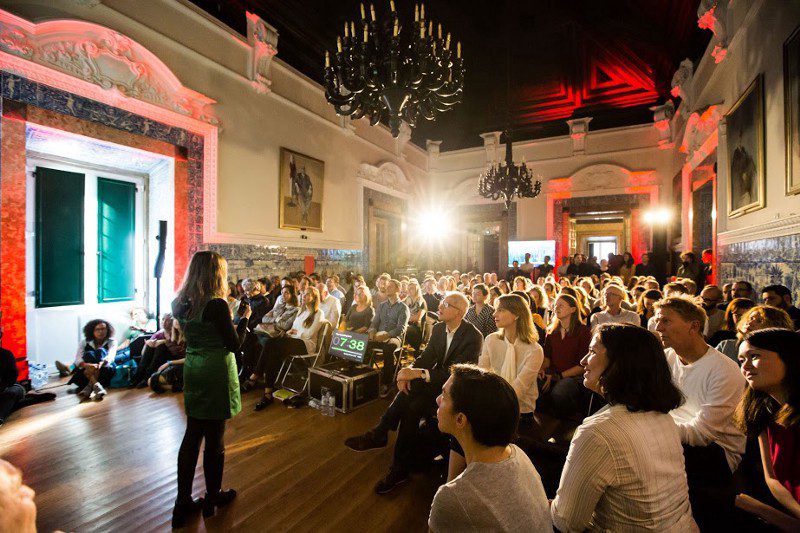Last week, the world’s largest technology conference was happening on one side of Lisbon, while a very different one was unfolding across town. The former — Web Summit — witnessed technologists reciting the impressive achievements and exponential prospects for their field. It convened 60,000 attendees and billed itself as the largest gathering of CEOs in history. At the House of Beautiful Business, in contrast, we had the great pleasure of facilitating a week-long conversation among a very eclectic group of 350 entrepreneurs, academics, artists, and business leaders, trying to unravel the human future of technology and business, albeit with more questions than answers.
Typically, discussions of technology and humanity stop at the design specs for the user interface. Or, more recently, they tend to focus on attempting to calibrate the feared displacement of jobs by Artificial Intelligence (AI). Participants in the House of Beautiful Business pushed further by attempting to understand how technology could affect our humanity and how we might shape it to our advantage. This involved revisiting some age old questions: what defines our humanity, what future do we want for ourselves, and how will we realize it? Needless to say, participants didn’t reach definitive solutions, but they did surface a number of important perspectives on the long-term impact of technology on business.
Who are we?
The artist Helene Lundbye Petersen kicked off the week with a performance drawing from her “11 books,” each based on a different color and representing a different facet of humanity from birth through love, conflict and death, and everything in between. It reminded us that before we can think about defining our desired destination, we must first address the philosophical imperative of “know thyself.”
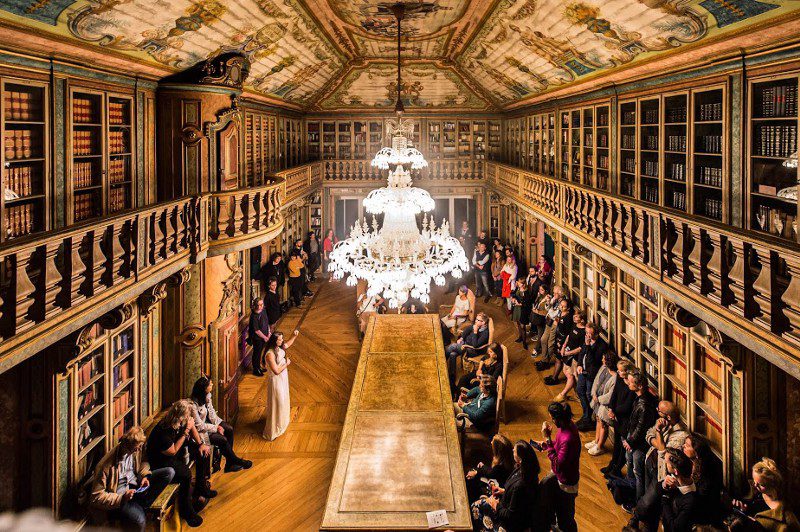
We heard from Keira Havens, the founder and CEO of Revolution Bioengineering, about the possibilities of biotechnology altering the very fabric of our being — our DNA. If our foundations are potentially malleable, how solid can our human identity be? The question of defining what makes us essentially human recurred throughout the event, especially in relation to which activities could or should be ceded to AI and what remains when this is done. Mortality, empathy, sociality, vulnerability and imagination were among the essential human qualities which were debated and explored. Ultimately, the value of technology will reside not mainly in the possibility of performing current tasks faster, cheaper, or more accurately, but in enhancing or complementing our humanity and our aspirations.
A more holistic view on business as a communal endeavor, in the spirit of Aristotle’s Oikonomia (the affairs of the family), manifested itself at the House throughout the week. In addition to intense discussions, participants broke bread together, experimented with AI and VR installations that probed and expanded perceptions, went on long walks, played soccer, and made music together.
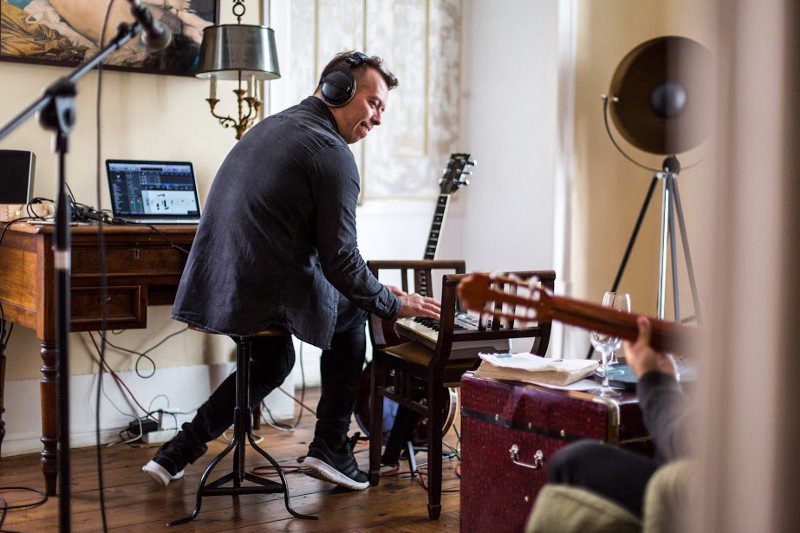
Why do we do what we do?
Ethnographer Jonathan Cook reminded us that our behavior is driven by more than functional and economic considerations. In particular, ritual serves to signal what is important to us and also to bridge our abstract beliefs and our concrete actions. His talk sparked discussion among participants about what new rituals we need, to signal what should be held sacred in a world where almost anything is possible and where boundaries of all types are being broken down. It is the deviations from economic rationality and instrumentalism which may most constitute our humanity and most deserve our attention, when considering future uses of technology.
Technology can be used to express our identity, or even allow us to commute between multiple identities without losing ourselves. Cook led a field trip exploring the Lisbon of poet Fernando Pessoa who became famous for his heteronyms (as opposed to pseudonyms) that each expressed a different — and often extreme — version of his character. Alternative identities expand the possibilities for experiencing and expressing an increasingly complex world. Cook made the point that Pessoa might serve as a role model for digital times, in which exponential technologies such as AI, VR, or AR allow us to assume “exponential identities,” thus liberating us from the more common reductionist notion that “you are your data”. Authenticity must not be confused with consistency. Rather, it can be the freedom to have multiple, even contradictory selves. From this perspective, even the “segment of one” marketing facilitated by digital technology may be an over-simplistic model.
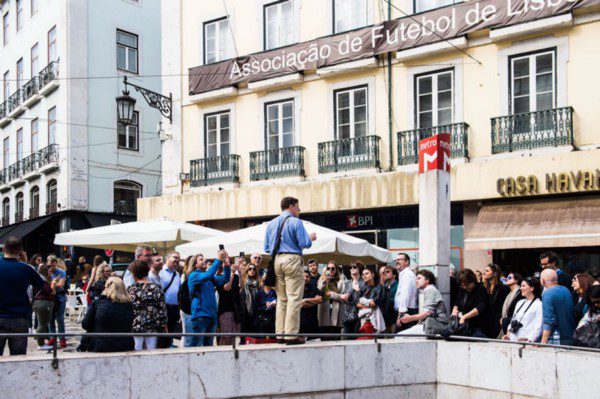
In a similar vein, the collective Artists Are Among Us encouraged us to sometimes embrace and explore our worst possible selves, rather than suppressing them. Martin Harrison of AI consultancy Kortical asked participants in a late-night living room session to share the stories behind their Instagram photos and how they really felt when they posted them. It was a remarkably eye-opening and comforting exercise that surfaced the underlying fears and desires we all share underneath our optimized, curated, and branded online personas.
Social activist and change maker Gemma Mortensen, co-founder of More in Common, in conversation with Julia von Winterfeldt, the founder and CEO of Soulworx (who also brought her Humans of New Work exhibition to the House) stressed the importance of giving people agency in overcoming growing social divides. She proposed micro-moments of attachment to foster a sense of belonging and connection. As an example, she referred to the “Great Get Together” initiative in the UK that invited millions of people across the country to spend the weekend with their neighbours. The need for agency also fundamentally changes the role of leaders, shifting from control and coercion to inspiration and humility: “Leadership is no longer about you, but it’s about your being in service of a greater cause,” Mortensen said.
What stories do we need?
We heard from the novelist Aditi Khorana about how people understand the world and align on a common worldview through storytelling. She described how stories are defined by how they answer the three timeless meta-questions of who are we, what we want, and what we must do to attain it? Many of the narratives we have inherited are about struggling to explore and survive in a hostile world, against the perils of nature and scarcity. In a world characterized by economic excess, domination of nature and virtually infinite information, what are the narratives we need to individually and collectively make sense of and shape the world?
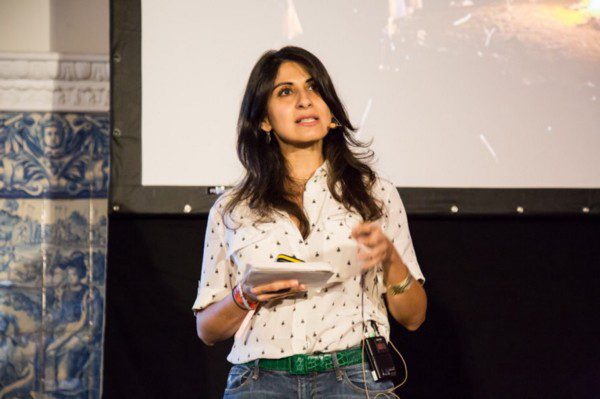
In an increasingly polarized world we must also think about whose stories we want to listen to. Anne Kjaer Riechert, the co-founder and CEO of the ReDi School of Digital Integration, showed that her social enterprise mission was successfully realized, not through a brilliant business plan, but by placing the people she tried to serve — those seeking asylum in Germany — in the center of the process. Inclusion and the narratives that emerge from it were the key to success.
We also learned from filmmaker Arun Chaudhary, who had served in the Obama White House and worked for the Bernie Sanders campaign, that the core of stories which effectively move people is authenticity — the unfettered realness of humans. In that sense, only what is truly ugly can be beautiful. Everything else is cosmetic. This hammers home the importance of rediscovering, in a world of economic demands and technological distortion, what authentic humanity looks and feels like. Chaudhary also made the point that “nothing is beautiful and only little is true.” Fake news, he argued, has always been there and has only been amplified by algorithms: “Objectivity is a business model,” he argued, but certainly not a realistic aim, let alone, a human virtue. This may sound cynical but is in fact a message of hope for brands and the marketers shaping them: perhaps what is needed is not so much an elusive, unattainable truth as much as new and better illusions?
How can we first imagine the future?
Of course, every bold vision of the future will first be dismissed as illusion. In a time when advanced technology is indistinguishable from magic, to paraphrase science-fiction author Arthur C. Clarke, humans must act as illusionists who do not seek perfect clarity but rather seek meaning in the fogginess of future possibilities.
We heard from Judith Wallenstein, Partner at the Boston Consulting Group, that the future of work is not an inevitability to be forecast and accepted or defended against, but rather a broad set of possibilities which can be shaped and realized by humans, if they can first be imagined. If that imagination is informed by merely changing a few variables in our status quo, we will limit or deceive ourselves. If that imagination is informed by films and literature painting coherent pictures of very different futures, it is much less likely to be constrained. Together, we explored alternative visions of the future through the lens of science fiction and asked ourselves what defines the essence of each tableau, what would make each more or less humane, how it could proactively be brought about, and what it would mean for us individually as leaders and knowledge workers.
How can we embrace vulnerability?
The comfortable stability of life in a large corporation may make technological change and discontinuity seem scary and unpalatable. From this perspective, the degeneration of society into a gig economy may seem like the least desirable future. And it may tempt us to define our strategy as ameliorating change and insecurity.
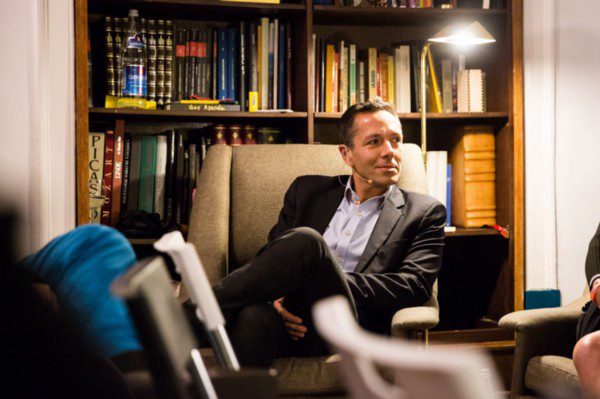
But INSEAD associate professor of organizational behavior Gianpiero Petriglieri showed us that the majority of the current gig economy is actually knowledge work, and that passion, vulnerability, and autonomy provide the motive force for many nomadic workers. While we might engineer social safety nets to ease transitions, vulnerability and change may actually bring out some of our most human qualities and abilities. Traditional employment conceives of our “career” as a linear and predictable progression of responsibilities, with the occasional setback, from adventure to stability to independence. The freelancer, however, experiences these stages all at once, in a constantly precarious manner that is both exhilarating and exhausting. But the reward is rich. For the freelance worker, “life is the ongoing journey of becoming one’s work,” as Petriglieri put it.
The innovation consultant Laurent Haug provided an immediately actionable tool for the mobile freelancer worker, allowing them to identify, measure, and trade their currencies, which, aside from money, include reputation, relationships, identity, access, experience, and other intangible assets. “You are a platform,” Haug insisted. His framework opened up the possibility of trading in these alternative currencies, thereby establishing entirely new marketplaces and types of social status. In the future, our value may hinge on the ideas we share, the relationships we cultivate, and the experiences we create.
How can technology make us more human?
Certainly, technology, especially AI, can eliminate the routine tasks that structure our working lives. In some plausible scenarios, there may simply be less “work” to go around. While dissolving familiar structures could be disorienting, in principle, it could also liberate us to focus on our higher aspirations. Dennis Mortensen, the founder and CEO of x.ai, presented a potential world of humans aided by an army of digital assistants taking care of mundane administrative jobs, thereby freeing up time for human enrichment. However, we would need to change how economics works to be able to realize a society based on leisure, self-development or interpersonal services.
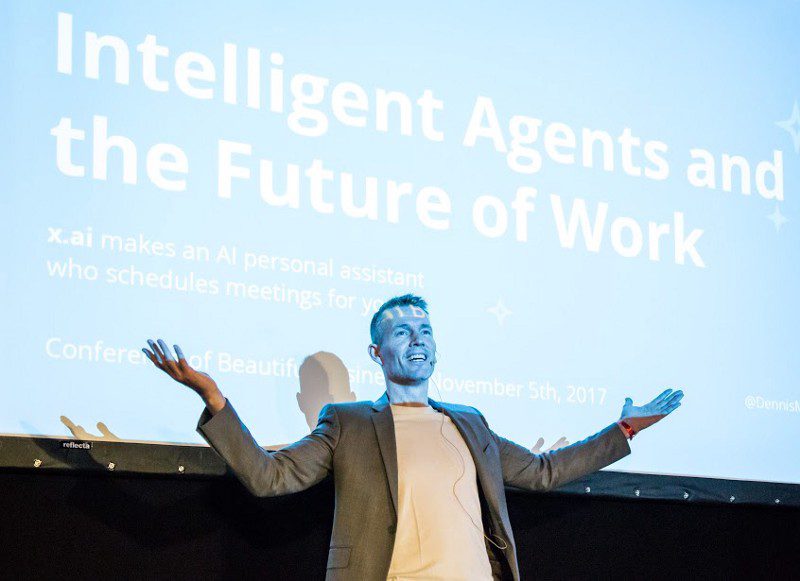
There are dangers, too. As we increasingly anthropomorphise technology, we tend also to “botify” and optimise humans. Digital anthropologist and emotional intelligence expert Pamela Pavliscak described how this trend should give us pause and rather inspire a re-humanization of humans in our accelerated digital times. In fact, a theme running throughout the conference was the importance of reconciling purpose and pace.
For her forthcoming book, “Superfast,” Sophie Devonshire, CEO of the Caffeine Partnership had interviewed more than 100 CEOs and business leaders, and her main take-away was this: the stronger the purpose, the faster the decision-making. Purpose strengthens intuition, and intuition is always one step ahead of rational assessment and analytics. Or in the words of Jo Burston, the founder of Rare Birds: “Formerly, you got fired when you didn’t have the data. Tomorrow, you will get fired when you don’t have intuition.”
A call to reflection
The relentless pace of technology is generally linked to a call to action. Learn, catch up, and self-disrupt before becoming a victim of disruption. An implicit learning from the House of Beautiful Business should be to balance this with a call to reflection. We should not be the passive recipients of an imposed or inevitable future. Rather, we are the agents of change, which should be designed to further our own human ends. Thrust, our ability to accelerate, must be matched by vector, our ability to steer. But our humanity is not so simple as to be self-evident. It must be distilled from our daily routines and distractions and re-conceived in a new context. We are at a historic turning point where reflection on who we are and what we want becomes paramount to successfully exploiting technology.
Speaking of “the lost art of reflection,” especially in business where there’s so often an action and reaction bias, the program at the House of Beautiful Business was interspersed by sporadic episodes of silence: from a minute of silence right at the opening, to a silent dinner (subversively taking place in a public restaurant amidst chatty fellow diners), to a one-hour long silent party that concluded the closing evening. When (almost) everything had been said and done, simply doing nothing and enjoying the quiet presence of fellow attendees, the collective quiet reflection of this emerging community, was a beautiful experience indeed. The silence was eventually broken by Aditi Khorana reading Mary Oliver’s “Upstream”: “Attention is the beginning of devotion,” she ended. Both are inherently human qualities, and both were in abundant supply this past week. In that sense, the House of Beautiful Business in Lisbon pushed the door wide open — to the real possibility of beautiful business, the launch of an emerging, powerful community devoted to a truly human future of work, and concrete actions and collaborations as a result.



